Defying predictions of a train wreck by almost every political pundit when he launched his quixotic bid for the Republican presidential nomination last summer, Donald Trump continues to amass delegates. Aghast by the prospect of Trump serving as their standard bearer this fall, Republican elites have launched their own extraordinary campaign to deny him the nomination; Mitt Romney, the GOP’s nominee in 2012, recently delivered a withering assault on Trump’s fitness for office, while a sizeable grouping of the Party’s foreign policy experts released a letter denouncing his lack of credentials. Staffers for Hillary Clinton, the likely Democratic nominee, are nervously preparing for what they privately think will be a difficult race against someone adept at mobilizing popular anger. Meanwhile, global headlines recoil at the thought of a Trump administration.
Is this alarmism justified? This week, we asked our program editors:
Should we fear a Trump presidency?
Michael Lumbers: Yes, But Not Because He’d Follow Through On What He Promises
Program Editor, Emerging Security
The prospect of a Trump presidency is particularly disquieting not so much because of what he will do if invested with power; rather, the ascension to the world’s most powerful office of a woefully unqualified demagogue appealing to tribal fears and emotions would stand as a shameful chapter for a country that has historically presented itself, at times with justification, as a model for others to emulate.
It’s difficult to predict what Trump would do in the White House. More so than any other presidential candidate in recent memory, he is a blank canvas, which makes it profoundly ironic that so many grassroots Republicans, for whom ideological purity is apparently so sacrosanct, should now rally to such a malleable, shifty character as their standard bearer.
Trump has a long history of espousing views heretical to party orthodoxy on a broad range of social issues. On the campaign stump, he continues to challenge conventional wisdom on entitlement spending, women’s health, free trade, and national security. Moreover, the crux of Trump’s message is that America’s best days are behind it and only his legendary leadership can bring them back, without getting into the inconvenient details of how this will happen.
These strikingly vague pronouncements, combined with an evasive tendency to veer back and forth on a given issue (often in the same week) and his repeated touting of his knack for bringing all sides together to make deals, suggest that Trump is without ideological moorings or a coherent governing philosophy. It’s difficult to avoid the conclusion that the presidency appeals to the vainglorious, self-aggrandizing Trump –who displays scant familiarity with the nuances of public policy, appears to rely mostly on his own counsel, and has no experience in political office –more as a notch in his belt than as a vehicle for advancing a thought-out agenda.
More likely than not, his most unviable proposals (take your pick: forcibly deporting more than 11 million undocumented immigrants, coercing Mexico into paying for the construction of a border wall, barring Muslims from entering the U.S., launching a trade war against China) are employed for rhetorical effect and wouldn’t even be seriously attempted, let alone adopted. Even if Trump defied expectations and acquired religion on the most controversial aspects of his campaign agenda, firm opposition from congressional Democrats, estrangement from Republican elites, and resistance from a sprawling national security establishment would considerably constrict his room for maneuver and limit his policy options.
What is cause for concern, however, is Trump’s reckless penchant for saying whatever it takes to gain applause from his base, even if that means denigrating women, mocking the disabled, exploiting prejudices against Latinos and Muslims or boasting about the size of his penis. The surreal, circus-like atmosphere surrounding his campaign has already invited bafflement and alarm abroad; should Trump, clearly lacking in judgment or gravitas, win the presidency, America’s soft power –defined by scholar Joseph Nye as “the ability of a country to persuade others to do what it wants through the appeal of its culture, political ideals, and policies” –would be seriously undermined. Even if much of his agenda were stalled, such a sensitive office should not be occupied by someone so oblivious to its responsibilities.
Aleksi Korpela: Of Fright And Fear
Program Editor, Procurement
Predicting the precise circumstances of the future is impossible. In lieu of this, we attempt to assess the future on the basis of the information we have. So, what does the information say about a Donald Trump presidency?
Trump’s very bold character has managed to capture the imagination of many Americans in articulating a sense of crisis in the current political climate and the position of the United States in global affairs. If he assumes office, much of the populist rhetoric will (hopefully) subside. Chances are that his presidency would be a mismanaged collage of failed policies, embarrassing diplomatic incidents, and headaches for the conservative establishment of the GOP.
If his uncompromising political positions, racism, xenophobia, and simplistic policies carry through, many of the current fears would be realized. Walls would be built, tariffs raised, diplomatic relations severed, and Muslims banned. But these are irrational policy stances, which are unlikely to be implemented – hopefully.
However, even if a Trump presidency wreaks havoc through the executive branch, this could result in the revival of Congress. After 50 years of declining legislative importance through the creation of agencies and political gridlock, perhaps a unified bipartisan effort might be born. It might yield initiatives to reform the political apparatus and lead to a new political culture that does not operate on polarizing rhetoric. Moreover, there will be some form of political reorganization within the Republican Party to avoid such discomfort in the future.
Fadi Dawood: A Complete Tragedy
Program Editor, Canada’s NATO
A Donald Trump presidency would be a disaster for the United States, as well as the international community. But what I really want to concentrate on is not Trump’s social policies. His rhetoric regarding immigration, gun control, health care, and other social issues would create serious problems for Americans. But the main concern for me is the international community and his foreign policy. His promise to increase America’s military presence in the Asia-Pacific would have disastrous consequences for the international community. War mongering and threatening China would only lead to conflict and undermine regional stability.
The other foreign policy disaster is Trump’s views on Iran. Iran, despite its despotic regime, continues to play an important role in the Middle East. Its influence on Iraq, Lebanon, Syria, and Yemen can’t be underestimated. By dismissing Iran and scrapping the 2015 nuclear agreement, Trump would send the Middle East into further instability, which would inevitably cause further displacement and add more to the current refugee crisis plaguing Europe and the Middle East.
This is just a sample of the larger problems that a Trump administration would beget. A Trump presidency is certainly the grimmest outcome for an international community still influenced by U.S. leadership.
Eimi Harris: We Should Fear The Rhetoric
Program Editor, Women in Security
Yes, we should be very afraid of a Trump presidency. Besides the extreme rhetoric and the unclear plans, much of what Trump has done during his campaign is appeal to nativist sentiment at the expense of U.S. relations with other countries.
For starters, Trump has been championing his plan for a wall along the border with Mexico. While this is supposed to address the issue of illegal immigration, Trump has made the situation worse by focusing on having Mexico pay for the wall. Beyond the extreme nature of a wall in the first place, you cannot just go around saying another country is going to pay for your policy solutions; that certainly is not helping Trump’s relations with Mexico and could be closing opportunities for discussions with Mexico about border issues.
Then there is Trump’s dispute with the Pope. While he has the right as a candidate to disagree with the Pope’s statements about his religious faith, there is a diplomatic way to do that – and Trump did not choose the diplomatic route. Making it sound like the Pope will regret not having Trump when (not “if”, but “when”) there is a terrorist attack on the Vatican is overly aggressive and, to me, has shown that Trump does not know how to differentiate between firm opposition and personal attacks.
In general, what Trump has done is garner support through an “us versus them” mentality. He has done this at home by appealing to particular ethnic groups (for example, his comments on making American Muslims register with the government). I think this rhetoric would be toned down once he is president when he realizes his initiatives to limit the actions of targeted groups will face much bureaucratic opposition, but there is not necessarily a “check” on Trump’s words in terms of foreign relations.
Although his foreign policy statements have hitherto faced limited international backlash because he is only a presidential candidate, imagine what would happen if he were president. Trump would be the face of U.S. diplomacy, and so far he has not demonstrated an ability to regulate his own words and play the careful diplomat. In projecting himself as a strongman, he could ignite serious diplomatic disagreements.




